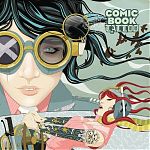- Articles
- Cherries
- Minutiae
- Q&A
- RAINN
- Releases
- Reviews
- Site News
- Them
- Toriphiles
- Touring
- TV/Radio/Web
- Video
News Archives
Keep an eye on our Twitter and Facebook pages since we often post quickie updates there when we're on-the-go.
During tours, we do our best to cover setlists in real-time on Twitter. If you want to tweet a show in, just DM or @ us on the day and tell us to watch your stream that night.
Tori is touring in 2017 to support the release of Native Invader. The European legs runs from early September through early October and the North American leg runs from late October to early December. We do not know if additional dates elsewhere will be added.

Native Invader (album, 2017)

Unrepentant Geraldines (album, 2014)

Gold Dust (album, 2012)

Night of Hunters (album, 2011)

Midwinter Graces (album, 2009)
 Abnormally Attracted To Sin (album, 2009)
Abnormally Attracted To Sin (album, 2009)
Live at Montreux 1991/1992 (DVD, 2008)

American Doll Posse (album, 2007)

A Piano (boxed set, 2006)

Pretty Good Years
(bio, 2006)

Fade To Red
(DVD, 2006)
 Comic Book Tattoo (book, 2008)
Comic Book Tattoo (book, 2008)News: Between The Lines Article (August 6, 2009)
I have challenges in my life just like anybody else, but I like being able to be a full-time musician and a mom and being able to get out there and do a pretty strong show for two hours – and not have to dance topless at some bar because I’m confused.
In this article, from PrideSource.com’s newspaper Between The Lines, Tori talks about the upcoming Christmas album, the gay community, and suicide, among other things. Thanks to Robert Beard for sending this in.
Sins & solstice
By Chris Azzopardi
August 6, 2009
Talking to Tori Amos is like getting lost in a bedtime story just before drifting off. Her pillow-soft voice is delicately soothing, often breaking for long pauses to thoughtfully deliver something as pensive and poetic – like, “I can hear things when I see” – as the music she’s released over the last two decades. When speaking to Between The Lines a couple weeks ago during a conference call to preview a string of upcoming “Sinful Attraction Tour” dates, including an 8 p.m. Aug. 8 stop at the Detroit Opera House, the alluring piano queen didn’t want to talk about herself.
“I’m always forced to talk to you people, but I’m a much better listener,” she admits. “I think doing interviews is really tricky; there’s an art form to it.” And so she approaches this one much like her masterpieces, carefully letting thoughts sift through her mind before they hit our ears. Just the opposite of her, it’s easy to see what’s heard.
The riff about her so-called Christmas album is presumably punctuated with her wide grin as she regrets not telling us more about it except that it won’t be, almost obviously given Amos’ religious scrutinizing, a party for Jesus. She’s going with a solstice theme, sweeping through tracks of the last 2,000 years and “twisting – in my way – some things you all might know, some things you might not know and presenting it in a different – a very different – kind of way, but hopefully beautiful.
“I’m not doing something obvious,” she continues. And when has she? That’s why we ask, half-kiddingly, whether she’ll do “Rudolph, the Red-Nosed Reindeer.” “No,” she says, laughing, like the notion of covering that is absurd and goofy. And it is – but, hey, she’s done “This Old Man.”
Outside solstice, the rest of her creative energy is being flushed into “The Light Princess” (a second draft was recently finished), a fairy tale about a gravity-less girl. It sounds just as weird as when the always-peculiar Amos split her psyche among five different women on her last LP, 2007’s “American Doll Posse.” When we ask where they’re hiding, she says, “I haven’t seen much of them. There are lots of redheads backstage right now.” She pauses and deadpans: “Not singing ‘Rudolph, the Red-Nosed Reindeer.’”
Amos’ 11th studio album, “Abnormally Attracted to Sin,” follows in the lineage of a string of oft-cryptic musings about religion, sensuality and sin. Here she challenged spiritual and sexual tug-of-war that she’s seen conflict many women during her recent travels. “It doesn’t seem to matter if they come from a more sexually liberal culture,” she says. “Some really almost segregate one from the other one when they step into it (their sexual self), so if they’re in a sexual moment then they leave the spiritual stuff behind, because they don’t know how to integrate. And this work was really about redefining what sin means to you.”
A woman almost offs herself on “Maybe California,” a song where Amos becomes the voice of hope to a woebegone mother ready to let her life slip away. As disheartening as it is, the narrative is based on real moms – not just one, Amos notes – who wondered if suicide would better their families. “I started to really understand the gravity of what that meant, because these aren’t women that are crazy. These are just women pushed to a point that they can’t fix the tragedies that have happened to their family, where they’ve lost everything.”
As a mother herself – Amos’ daughter, Tash, turns 9 next month – she sympathized: “How close are we all? I think for some of us, it just depends on the day.
“I have my days just like anybody else,” she goes on.” I have challenges in my life just like anybody else, but I like being able to be a full-time musician and a mom and being able to get out there and do a pretty strong show for two hours – and not have to dance topless at some bar because I’m confused. I guess that’s a happy place to be.”
This elation, and maybe not enough little earthquakes, could be her music’s biggest fault, as her latest musings – namely those on “Sin” – have left many critics cold. Is Amos just too damn happy? “I don’t know if people really know my state of mind or not; I keep things pretty private, so I don’t think they know if I’m sad or not,” she says. “As you know, I don’t read the critics, because I think most of them really want book deals anyway – and are bitter. Most of them; not all of them.”
Regardless of what critics say, something praise-worthy about Amos is her unwavering support of the gay community. She’s been consistently vocal about the issues, and only a couple years after explaining what a “homo” is to her daughter (as she told us during our last interview, back in October 2007), the almost-autonomous Tash understands the community more. “She knows that some people have a problem with two men kissing and being involved as a couple, and she knows that some people think that women that want to live together and love each other in that way shouldn’t have rights.”
Tash is a bright kid, Amos says – and very entertaining on the tour bus – and both she and her husband, British sound engineer Mark Hawley, carefully monitor their relationship on the road, keeping their tiffs as private as they can. Sometimes their daughter steps in, telling them to leave it outside.
“Most people leave their work and then go home to their lovers,” she says, “and talk crap about the people they work with.” She laughs. An energetic burst breaks through the line, her closed mouth likely contorting upward as her dimples set.
Yes, you can see it.


